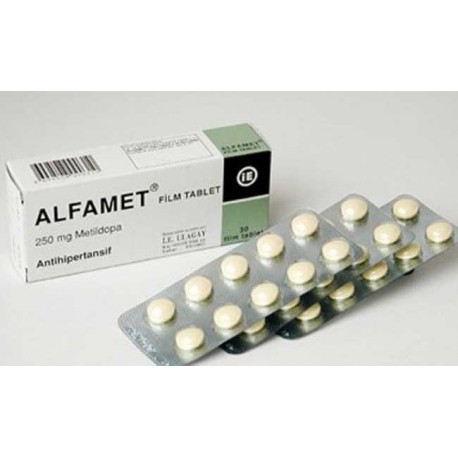 View larger
View larger Aldomet Methyldopa 250 Mg 30 Tablets
ALF6699
New product
BUY MORE PAY LESS
| Quantity | Discount | |
|---|---|---|
| 2 | 5% | |
| 3 | 10% | |
| 4 | 15% | |
| 5 | 20% |
Volume discounts
| Quantity | Discount | You Save |
|---|---|---|
| 2 | 5% | Up to $3.20 |
| 3 | 10% | Up to $9.60 |
| 4 | 15% | Up to $19.20 |
| 5 | 20% | Up to $32.00 |
More info
ALFAMET (Generic Aldomet) Film tablet For oral administration.
Active ingredient
: 250 mg of methyldopa.
Excipients
Citric acid, EDTA di sodium, PVP K-30, CMC, aerosil, magnesium stearate (88.5%), diethyl phthalate, HPMC, talc, titanium dioxide, FD&C yellow no.5, ewax.
1. What is ALFAMET (Generic Aldomet) and what is it used for?
ALFAMET (Generic Aldomet) is a yellow, round, odorless, biconvex film-coated tablet. It contains an active substance called methyldopa. This substance belongs to a group of drugs called antihypertensives, which are used to lower blood pressure (blood pressure).
ALFAMET is used in the treatment of high blood pressure (hypertension).
2. How is ALFAMET (Generic Aldomet) used?
Instructions for proper use and dose/frequency of administration
In adults:
Starting dose:
The usual starting dose of ALFAMET (Generic Aldomet) is 250 mg 2 or 3 times a day for the first 48 hours, unless your doctor recommends another dose. Your doctor may reduce or increase this dose, preferably at intervals of not less than two days, until an adequate response is obtained.
If your doctor has increased your drug dose, you should take this dose in the evening to experience the sleep-inducing effect of ALFAMET (Generic Aldomet) less during the day.
Maintenance (continued) dose:
The usual daily dose of ALFAMET (Generic Aldomet) is 500 mg to 2 g 2-4 times. The maximum recommended daily dose is 3 g, although sometimes patients respond to higher doses. A suitable blood pressure can be reached in most patients within 12 to 24 hours.
Depending on the course of your treatment, your doctor may also give you another medicine.
Application route and method
It is administered orally. Take your medicine with a glass of water.
Use in children
The starting dose is 10 mg/kg 2-4 times a day. The daily dose is increased or decreased until an adequate response is obtained. The maximum dose is 65 mg/kg and 3 g daily. Your doctor will determine the dose according to the condition of the disease.
Use in the elderly:
In elderly patients, the starting dose should be kept as low as possible, not exceeding 250 mg per day. In these patients, the appropriate starting dose should be 125 mg twice daily and slowly increased as needed, but the maximum daily dose of 2 g should not be exceeded.
Special use cases
Kidney failure:
Dose range in patients with mild renal impairment (Glomerular-filtration rate (GFO) greater than 50 ml/min) every 8 hours, in patients with moderate renal impairment (GFO 10 to 50 ml/min) every 8-12 hours In patients with severe renal impairment (GFO less than 10 ml/min), it should be increased every 12-24 hours.
Liver failure:
No data available.
3. What are the possible side effects?
Like all medicines, there may be side effects in people who are sensitive to the substances contained in ALFAMET.
Side effects are listed as shown in the categories below.
Very common: may occur in at least 1 in 10 patients.
Common: less than 1 in 10 patients, but at least 1 in 100 patients.
Uncommon: May be seen in less than 1 in 100 patients, but in at least 1 in 1000 patients. Rare: may be seen in less than 1 in 1000 patients but at least 1 in 10,000 patients.
Very rare: less than 1 in 10,000 patients.
Not known: Cannot be estimated from the available data.
Very common:
• Dizziness Infrequent:
• Positive Coombs test (blood incompatibility), anemia, bone marrow depression, decrease in white blood cell count, decrease in granulocyte density in the blood, decrease in the number of platelets, increase in the number of eosinophils (a type of allergy cell) in the blood, increase in urea in the blood, antinuclear antibodies, LE cells, and positive tests for rheumatoid factor,
• Drug-induced fever, lupus-like syndrome (joint pain, joint inflammation, muscle pain, immune system disease with fever), heart muscle inflammation, pericardial inflammation,
• Increase in prolactin hormone,
• Transient somnolence, headache, weakness or weakness, numbness, parkinsonism, Bell's palsy (a type of facial paralysis), involuntary choreoathetotic movements (involuntary muscle contractions of the hand and foot muscles), nightmares, impaired mental sensitivity, reversible mild psychosis (a type of facial paralysis). type of mental disorder) or psychic disturbances including depression, fainting and cerebrovascular insufficiency symptoms,
• Slowing of the heartbeat, inappropriate decrease in blood pressure and heart rate, exacerbation of chest pain, sudden drop in blood pressure when standing up, swelling, edema,
nasal congestion,
Nausea, vomiting, bloating, constipation, flatulence, diarrhoea, gastrointestinal inflammation, mild dry mouth, tender or "black" tongue, pancreatitis, salivary gland inflammation,
liver disorder including hepatitis, jaundice, abnormal liver function tests,
Eczema, skin rashes, toxic epidermal necrolysis (a serious disease with fluid-filled blisters on the skin),
• Mild joint and muscle pain with or without swelling in the joint,
• Absence of menstruation, breast enlargement, male breast enlargement, milk coming from the breast, insufficiency in sperm ejaculation (ejaculation), sexual weakness, decreased sexual desire.

